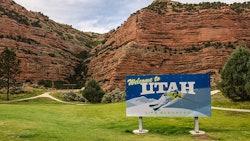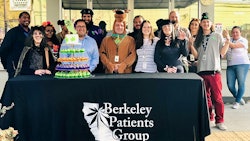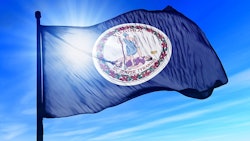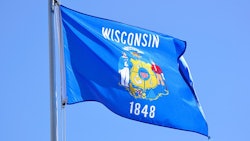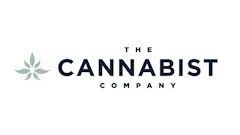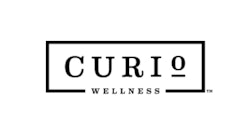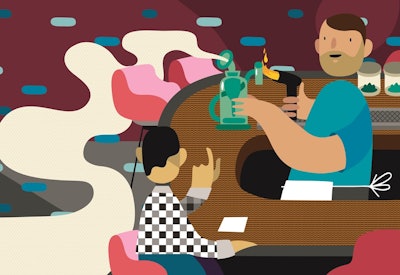
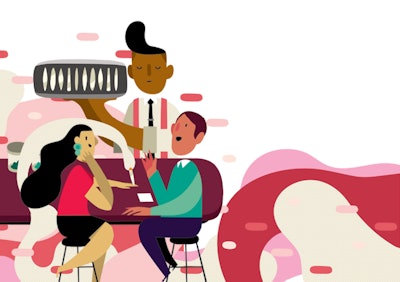
Consuming cannabis has long been a social activity. An ancient nomadic tribe called the Scythians built fire pits that they used to burn cannabis for ceremonial purposes. In the 1960s and 1970s, hippies smoked while standing in circles to tell stories, laugh and share ideas. Even throughout the height of prohibition, in the 1980s and 1990s, people shared cannabis at concerts and “smoke-ins.”
Which clearly brings up a problem with most of the current cannabis legalization laws: There’s no place to smoke it but home. This means every consumer, including tourists, in a legal market is supposed to figure out how to get or give an invitation to someone’s private home. Awkward.
Only California’s 2016 voter-approved legalization measure, Proposition 64, permitted municipalities to allow cannabis lounges from the outset. After all, lounges have been running across the state since 1999, regulated under local medical cannabis regulations. Alaska and Colorado both modified their state laws to allow them earlier this year. And, in May 2019, Las Vegas created city regulations to allow consumption at a limited number of qualified dispensaries, hopefully setting the stage for a Nevada state law change, too.
Out of 482 municipalities in California, only around a dozen (based on my tracking of statewide regulations) have laws regulating cannabis lounges. San Francisco has 12 retail dispensaries where you can smoke or vape on-site, from small neighborhood spots like the Vapor Room and SPARC to Moe Greens, a giant space featuring large, luxurious booths in the smoking room.
I operate a cannabis lounge in Oakland, called Magnolia Wellness, where vaporizing cannabis and eating edibles is allowed, as is live music and events of all kinds. But because of local restrictions, we don’t allow people to smoke cannabis inside. Magnolia hopes to solve this soon by installing an outdoor marijuana smoking patio, which is allowed by local law. Emeryville, another Bay Area city, allows lounges as well, and nearby Berkeley is deliberating a lounge law right now.
But, the big news in California is West Hollywood, which has awarded eight licenses that permit smoking, vaping and edibles and another eight licenses for edibles only, according to a December 2018 license application report from the city. To get more insight, I interviewed lounge permittee Jackie Subeck, one of the owners of a West Hollywood dispensary (still to be named), who’s helping to lead both local and statewide regulatory efforts for on-site consumption.
According to Subeck, her space is licensed as an “edibles consumption” lounge, meaning she can’t sell cannabis flowers, only edibles for patrons to consume while there.
If Denver saw the emergence of the Church of Cannabis laser light show, it’s easy to imagine that Las Vegas lounges will blow our minds.
Subeck’s company, Hey Jackpot, has partnered with CannaKids, a California-based supplier of medical cannabis oil tinctures and cannabis products to patients of all ages, to launch the lounge. CannaKids will create a full-service day spa with THC, CBD and whole-plant cannabinoid treatments available.
It’s a challenge to actually be able to open the doors for business though, Subeck explains, as the local licensing scheme is broader than state law allows. In other words, while local law allows licensees to make and sell both infused and non-infused foods, state law forbids it.
Legal Hurdles
While companies with state manufacturing licenses could certainly make edibles, state law requires all cannabis products to be lab tested, so it’s impossible to make fresh goods to sell. Testing is expensive, so large batches are required for cost effectiveness; to be worthwhile, batches are generally 500 units or more, and it can take upwards of a week to complete the tests. That’s a lot of baking for a small local kitchen, whose baked goods would then be a week old before even hitting shelves.
Subeck is leading the statewide effort to change this and other, related laws and formed a coalition of other lounge owners and advocates for the fight. “Perhaps by 2021, we will be able to infuse our own fresh foods and beverages and serve them directly to the customer,” she says. “Although state law prohibits us from doing this today, we are certainly planning for the future.”
While companies with state manufacturing licenses could certainly make edibles, state law requires all cannabis products to be lab tested, so it’s impossible to make fresh goods to sell.
Such a change could allow restaurants serving cannabis-infused foods to exist. In the meantime, Subeck says lounge operators are getting creative to find work-arounds.
None of the West Hollywood lounges has opened yet (as of July), but Lowell Cafe is likely to be first. Places like Subeck’s are at an obvious disadvantage, though, because edibles-only lounges, a forward-thinking idea when the local license type was created in 2017, are now out of sync with current trends. Most of the state’s lounges, about 45 total, are located in retail dispensaries. Without the right to sell cannabis flowers and concentrates, it will certainly be hard to compete with those.
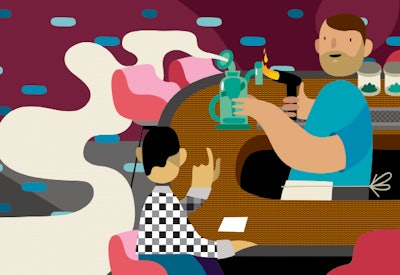
Colorado’s cannabis lounge law, set to take effect in 2020, looks really fun, in comparison. It includes two tracks, one where dispensaries have tasting rooms, like wineries, where people can sample the goods and purchase on-site. The other is where businesses like movie theaters and cafés can get licenses for cannabis consumption, so people can bring their own and use it on-site.
The city of Denver has a pilot project underway, having licensed several cafés for on-site consumption, events, and sales of items like t-shirts and coffee, but without cannabis sales allowed. Colorado Springs has a similar pilot project, and others will surely follow now that the state law has changed.
As Cindy Sovine, a Colorado leader of the on-site consumption movement, recently pointed out to me, this law provides a way for an entirely new group of people to enter the industry—a variety of small entrepreneurs can gain access to the Colorado market by opening lounges, cafés, and entertainment facilities for consumers.
I recently visited the International Church of Cannabis in Denver, which only allows members to consume during their weekly Sunday services. Other days of the week, people are invited to visit the church store and game room or to attend any number of its special events.
Most exciting, though, is its laser light show, held in its psychedelic rectory at 20 minutes past most hours (hint: that means it’s 4:20 somewhere). The walls and ceilings are painted with intense patterns and images, and the laser show is an actual 30-minute Pink Floyd laser light show with guided meditation.
Colorado’s cannabis lounge law, set to take effect in 2020, will allow dispensaries to have tasting rooms, like wineries, where people can sample the goods and purchase on-site.
Laying down on a pew, about an hour after eating a legal edible, and watching the show, I felt such a great experience of peace, happiness and wonder that tears came to my eyes, and I hoped that every single person could experience the same. Of course, you can; just visit the church any day they’re open.
If Denver saw the emergence of the Church of Cannabis laser light show, it’s easy to imagine that Las Vegas lounges will blow our minds. Dispensaries farther than 1,000 feet from schools and casinos will be able to apply for these licenses, as long as they have room to separate the smoking spaces from the sales floor. About 12 dispensaries are qualified, so these should start popping up soon.
California’s law also allows special event licenses, where applicants can hold events with on-site consumption allowed. All county fairgrounds are covered by this law, as are other designated locations controlled by local municipalities.
The High Times Cannabis Cups, The Emerald Cup and the Hall of Flowers events are all licensed under these rules. This is a great way to equalize the movement and to preserve our culture. Anyone can apply for these licenses, even for just a one-time event, and host the cannabis festival of their dreams.
Together, dispensary operators must push for these rules across all legal states and in cities. Yes, we are an industry, but more importantly, we are a community and a culture; we always have been, and we always will be.










